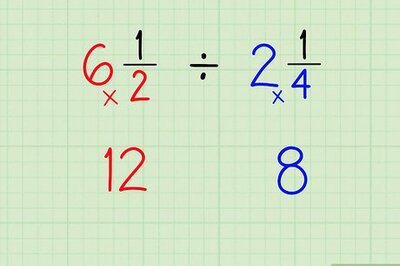
views
Sunlight does a lot for us, the reason sunbathing has been considered very beneficial for the body. Whether you have inflamed and painful joints, arthritis pain, or inflammation, a daily dose of sunshine will definitely keep the doctor away and offer various health benefits. Sunlight provides Vitamin D, which helps bones absorb calcium and further reduces the risk of fractures.
These facts are well known, but recent research has revealed that sunlight also influences how much some of us eat. Yes, you read that correctly. A team of researchers at Tel Aviv University in Israel claim that sun exposure appears to stimulate hunger—though only in males.
Researchers examined data from the three-year National Health and Nutritional Survey (MABAT) in Israel, which included 3,000 participants between the age cap of 25 to 65 years. By tracking season, food intake, and self-reported sex, the researchers discovered that men boosted their consumption by 17 percent during the warmer months of March through September compared to the rest of the year, while women’s food consumption remained constant.
To confirm this finding, researchers asked 13 men and 14 women between the ages of 18 to 55 to spend 25 minutes in the sun. After spending time in the sunlight, when the participants were asked about their appetites, men reported feeling hungrier, while women experienced no significant differences in their hunger levels. To understand the reason, the researchers collected blood samples of the participants before and after the sun exposure.
Scientists found that levels of ghrelin were elevated in men, a hormone that stimulates appetite after they spend time in the sun. Researchers said that when they saw differences in the participant’s blood proteomics, they said it was true. “Males are reacting to the ultraviolet rays [with increased appetite] and females are not,” says study coauthor Carmit Levy, a molecular biologist at Tel Aviv University.
The research identifies the skin as a primary regulator of energy and appetite (metabolism) in both humans and lab models.
Professor Levy further explained that they examined the differences between males and females after sun exposure and found that males eat more than women because their hunger pangs have increased.
“Our study was the first gender-dependent medical study ever conducted on ultraviolet exposure, and for the first time, the molecular connection between ultraviolet (UV) exposure and appetite was deciphered. Gender-dependent medical studies are particularly complex, as twice the number of participants is required to find statistically significant differences,” elucidated Professor Levy.
There is a dramatic metabolic difference between men and women, affecting both their health and their behaviour, the authors wrote. It has not yet been established whether the two sexes respond differently to exposure to the sun’s ultraviolet radiation.
“The protein p53, found in the largest organ in our body, skin, repairs damage to the DNA caused by sunlight, but it does more than that. It signals to our bodies that winter is over and we are out in the sun, possibly in preparation for the mating season.” the professor concluded.
The results provide an encouraging basis for future studies on both human metabolism and the potential UV-based therapies for metabolic diseases and appetite disorders.




















Comments
0 comment